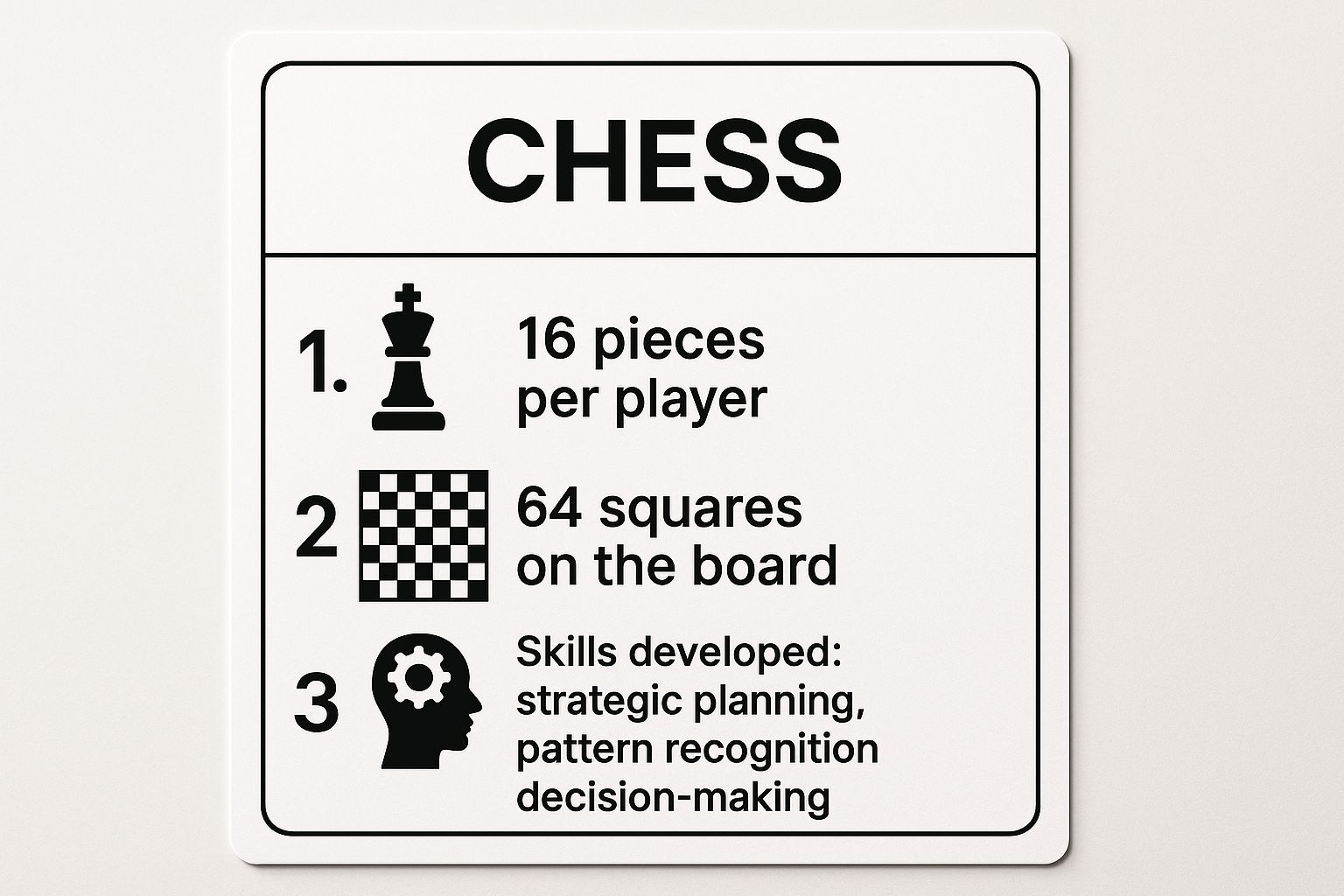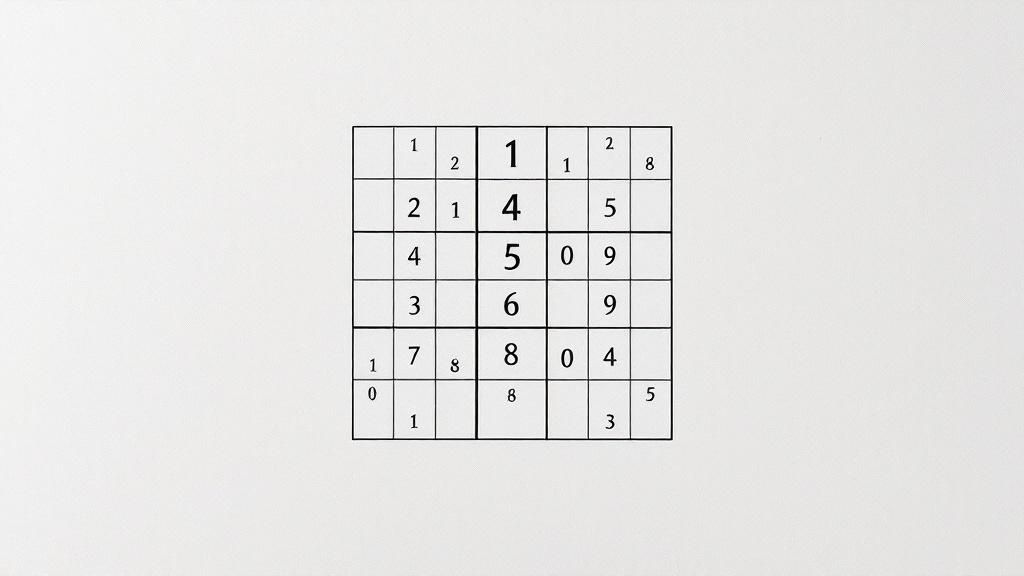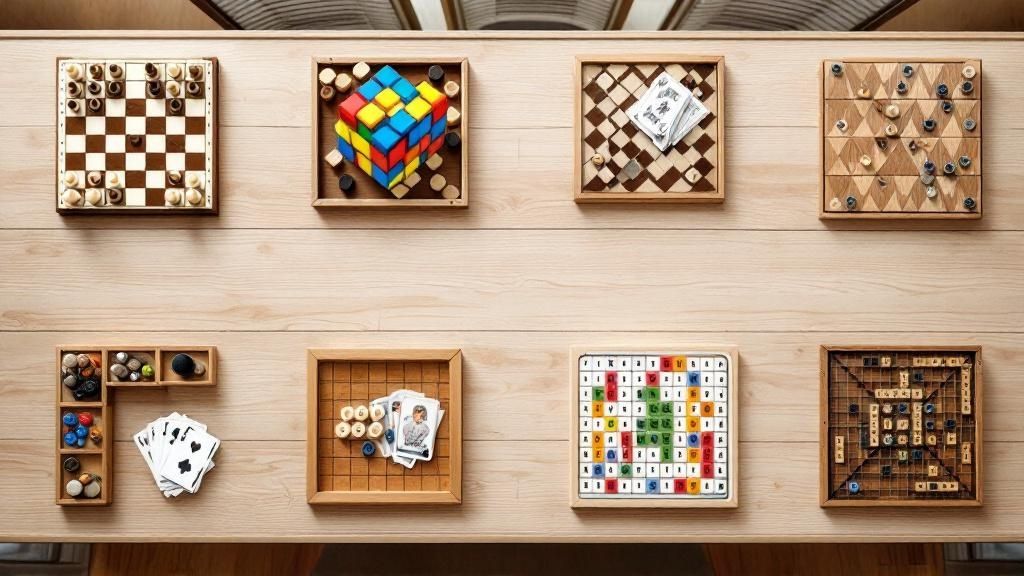In an age of constant information and complex challenges, the ability to think critically is more valuable than ever. It's the engine that drives effective decision-making, innovative problem-solving, and deeper understanding. While many associate cognitive training with rote memorization or simple puzzles, a far more engaging and effective method lies in strategic gameplay. This article explores a curated selection of critical thinking games for adults, moving beyond the obvious to uncover experiences that genuinely challenge and enhance your analytical, strategic, and logical reasoning skills.
These games are not just pastimes; they are sophisticated tools designed to sharpen your mind, offering a dynamic and enjoyable path to mental acuity. They serve as excellent gifts for discerning individuals, engaging recreational activities for families, or even premium additions to a corporate environment, blending aesthetic appeal with intellectual substance.
Within this guide, we will delve into what makes each game a powerful cognitive workout. You will discover the specific skills each selection develops, from spatial reasoning and pattern recognition to long-term planning and resource management. We will provide actionable insights into how to approach each game to maximize its benefits, ensuring you gain a practical framework for integrating these activities into your life for lasting intellectual enhancement. This curated list offers a clear path to elevating your cognitive fitness through immersive, strategic play.
1. Chess
Chess is a quintessential two-player strategy board game, renowned for its depth and intellectual challenge. Played on a 64-square checkered board, each participant commands an army of 16 pieces, with the ultimate goal of cornering the opponent's king in a position of inescapable capture, known as "checkmate." This ancient game is a masterclass in foresight, calculation, and psychological warfare, making it one of the most effective and enduring critical thinking games for adults.
The game's power lies in its demand for players to think several moves ahead, evaluate complex positions, and adapt their strategies in response to an opponent's actions. It rigorously trains the mind to recognize patterns, manage resources, and make decisive judgments under pressure. This is why chess is frequently integrated into diverse and high-stakes environments, from corporate training programs at major tech companies to strategic instruction in military academies.
Actionable Tips for Improvement
To begin your journey with chess, concentrate on foundational knowledge rather than rote memorization.
- Master the Basics: Start by learning the movement of each piece and understanding simple tactical motifs like pins, forks, and skewers.
- Practice with Puzzles: Use puzzle books or dedicated apps to solve daily tactical puzzles. This sharpens your pattern recognition without the pressure of a full game.
- Analyze Your Games: After each match, review your moves. Identify where you went wrong and what you could have done differently. This self-correction is crucial for growth.
The following infographic provides a quick reference to the fundamental components of chess and the cognitive benefits it offers.

As the visualization highlights, the defined structure of the game provides a perfect arena for honing complex cognitive skills. While chess requires deep strategic thinking, other classic games also offer valuable lessons; for instance, you can explore backgammon strategies on marblecultures.com to broaden your tactical abilities. Engaging with these time-honored games provides a robust framework for enhancing analytical and strategic thinking applicable to many real-world scenarios.
2. Portal Series
The Portal series, developed by Valve Corporation, is a groundbreaking first-person puzzle-platform video game that has redefined the genre. Players navigate a series of sterile test chambers armed with a "portal gun," a device capable of creating two interconnected wormholes on flat surfaces. The objective is to use these portals to manipulate objects and oneself, solving complex spatial puzzles that require a profound understanding of physics, momentum, and three-dimensional logic. Its unique mechanics make it one of the most intellectually stimulating critical thinking games for adults.
The game's brilliance is its ability to teach complex scientific principles through engaging, hands-on experimentation. It forces players to abandon conventional thinking and develop innovative solutions, rigorously training spatial reasoning, problem-solving, and creative thinking. Due to these benefits, the Portal series is often used in diverse educational contexts, from computer science courses teaching 3D programming concepts to STEM curricula demonstrating physics principles. Its cooperative mode is also used in corporate team-building exercises to foster collaborative problem-solving.
Actionable Tips for Improvement
To get the most out of the Portal experience, approach the game as a series of scientific experiments.
- Master the Physics: Take time to understand the core principles of momentum conservation. A long fall into one portal creates a high-speed exit from the other. This concept is fundamental to solving advanced puzzles.
- Experiment Freely: Don't be afraid to try unconventional portal placements. The game encourages trial-and-error, and the most creative solutions are often the most effective.
- Leverage Cooperative Play: Engage with Portal 2's cooperative mode. It introduces puzzles that require teamwork and communication, adding another layer of strategic depth and enhancing collaborative critical thinking.
The following gameplay trailer showcases the unique mechanics and puzzle-solving environment that make Portal a standout title.
As the video illustrates, Portal's design provides an unparalleled digital sandbox for developing fluid intelligence and spatial awareness. While Portal excels in digital problem-solving, classic games offer different cognitive challenges; for example, you can explore backgammon strategies on marblecultures.com to build your tactical skills in a traditional setting. Integrating both digital and analog games creates a well-rounded approach to cognitive enhancement.
3. Sudoku
Sudoku is a logic-based, combinatorial number-placement puzzle that has captivated millions worldwide. The objective is to fill a 9×9 grid with digits so that each column, each row, and each of the nine 3×3 subgrids that compose the grid contain all of the digits from 1 to 9. Its power as a mental exercise comes from its reliance on pure logic and deduction rather than mathematical calculation, making it an exceptional example of critical thinking games for adults.

The game’s elegance lies in its simple rules but complex solutions, demanding players to identify patterns, form hypotheses, and systematically eliminate possibilities. It trains the brain to switch between holistic and detail-oriented thinking as you scan the entire grid and then focus on individual cells. This is why Sudoku is widely used in diverse settings, from cognitive therapy programs for enhancing memory in elderly patients to corporate wellness initiatives aimed at improving focus and reducing stress among employees.
Actionable Tips for Improvement
To move from a novice to a proficient Sudoku solver, focus on developing systematic techniques over random guessing.
- Use Pencil Marks: Lightly write down all possible candidates for each empty cell. This technique, known as "Snyder notation," helps visualize possibilities.
- Learn Basic Techniques: Master fundamental strategies like "naked singles" (a cell with only one possible number) and "hidden pairs" (two cells in a box, row, or column that are the only ones with two specific candidates).
- Work Systematically: Don't jump randomly around the grid. Methodically scan each row, column, and 3x3 box to identify easy placements first.
- Practice with Purpose: Regularly solve puzzles that are just slightly above your comfort level. Gradually increasing the difficulty is key to improving your logical deduction skills.
As the puzzle highlights, the structured nature of Sudoku provides an ideal environment for strengthening analytical reasoning. While Sudoku focuses on logical deduction, other classic games offer complementary cognitive benefits; for instance, you can explore backgammon strategies on marblecultures.com to build your tactical versatility. Engaging with these games develops a well-rounded set of critical thinking skills applicable to various professional and personal challenges.
4. Wingspan
Wingspan is a competitive, medium-weight strategy board game where players assume the roles of bird enthusiasts, researchers, and collectors. The primary objective is to discover and attract the most diverse and powerful birds to a personal network of wildlife preserves. This beautifully illustrated game is an exceptional exercise in strategic planning and resource management, making it one of the most celebrated modern critical thinking games for adults.
The game's intellectual depth stems from its engine-building mechanic. Each bird card played offers unique abilities that can create powerful, interconnected combinations, requiring players to think several moves ahead. Participants must balance short-term gains with long-term goals, adapt to the random draw of new birds, and manage limited resources effectively. This complex interplay of mechanics is why Wingspan is a staple at library game nights for adult learning, corporate team-building exercises, and in environmental education programs.
Actionable Tips for Improvement
To excel at Wingspan, focus on creating efficient systems and adapting to the game's flow.
- Build an Engine Early: Prioritize playing birds in the first few rounds that provide essential resources like food or extra cards. This initial investment will accelerate your progress later.
- Balance Costs and Benefits: Carefully evaluate each bird. A high-point bird may be tempting, but its cost might set you back more than a cheaper bird with a powerful ongoing ability.
- Focus on Bonus Cards: Pay close attention to your end-of-round goals and secret bonus cards. Aligning your strategy with these objectives is often the key to victory.
- Practice with Solo Mode: Wingspan includes a robust solo mode. Use it to familiarize yourself with the game's mechanics and learn common bird combinations without the pressure of a competitive match.
The strategic decision-making in Wingspan makes it a rewarding experience for those who enjoy tactical challenges. For players interested in similar strategic depth in a two-player format, you can discover other engaging board games for adults on marblecultures.com to further enhance your critical thinking skills. Engaging with these thoughtful games provides a valuable framework for developing adaptable and forward-thinking problem-solving abilities.
5. The Witness
The Witness is a singular first-person puzzle adventure game that immerses players on a lush, uninhabited island filled with hundreds of intricate line-drawing puzzles. Created by acclaimed designer Jonathan Blow, the game presents a world where the primary mode of interaction is solving these grid-based challenges. There are no instructions or tutorials; players must learn the rules governing each puzzle set through pure observation, experimentation, and logical deduction. This process of discovery makes it one of the most profound critical thinking games for adults.

The game’s genius lies in its non-linear design and its method of teaching through silent experience. As you explore the island, you encounter new puzzle mechanics that build upon previously learned concepts, demanding you form and test hypotheses. This structure has made The Witness a subject of study in game design courses for its masterful puzzle composition and in cognitive science research for its insights into the learning process. It serves as a powerful tool for developing analytical reasoning, spatial awareness, and the ability to connect seemingly disparate ideas.
Actionable Tips for Improvement
Success in The Witness comes from changing your perspective, both literally and figuratively.
- Keep a Notebook: Actively sketch puzzle layouts and jot down your theories about new symbols and rules. This externalizes your thought process and helps solidify your understanding.
- Embrace Non-Linearity: If a puzzle area feels too difficult, simply walk away. Explore a different part of the island; a new discovery elsewhere often provides the "aha!" moment needed to solve the previous challenge.
- Observe Your Surroundings: Many puzzle solutions are directly informed by the environment. Pay close attention to shadows, reflections, colors, and natural formations around you.
- Take Breaks: The puzzles can be mentally taxing. Stepping away allows your subconscious to process complex rule combinations, and you may find the solution comes to you effortlessly upon returning.
6. Azul
Azul is a visually striking tile-placement game where players compete to score points by strategically drafting colored tiles to decorate a palace wall. Inspired by the Moorish art of azulejos, the game challenges participants to select tiles from central "factories" and arrange them on their player boards. The objective is to complete horizontal and vertical lines, collect sets of specific colors, and avoid taking unusable tiles that result in penalties. This elegant game serves as a brilliant exercise in abstract strategy and is one of the most accessible yet deep critical thinking games for adults.
The game's strategic depth emerges from the tension between optimizing your own board and disrupting your opponents' plans. Every tile you take directly impacts the options available to others, forcing constant risk assessment and adaptive planning. Players must weigh short-term gains from completing a row against the long-term goal of building high-scoring patterns. Azul is widely used in settings ranging from family game nights and educational math programs to senior centers for cognitive stimulation, proving its value in developing tactical foresight and resource management skills.
Actionable Tips for Improvement
To excel at Azul, focus on efficiency and forward-thinking rather than just grabbing the most numerous tiles.
- Plan Your Wall: Before the first round, identify which color sets will be easiest to complete on your final 5x5 grid and prioritize them.
- Anticipate Opponent Needs: Pay close attention to your opponents' boards. Sometimes, it's better to take a tile you don't need to prevent them from completing a valuable line.
- Balance Scoring and Penalties: Learn when to take a small penalty to set up a massive score in a future round. Don't be afraid to take negative points if it serves a larger strategic purpose.
- Think Ahead: Always consider how your current choices will affect the tiles left in the center for the next player and for yourself in subsequent rounds.
7. Baba Is You
Baba Is You is a unique single-player puzzle game that challenges players to think about logic and language in a profoundly new way. Instead of merely following rules, participants must actively manipulate them. The game world is composed of movable blocks, some of which are words that form grammatical rules like "Baba Is You," "Wall Is Stop," and "Flag Is Win." By pushing these word blocks around, players can forge new rules to alter the game's physics and objectives, fundamentally changing how the level works to achieve victory.
The game's genius lies in its requirement for meta-cognitive thinking; players must analyze the system of rules itself, not just the puzzle within those rules. This process directly strengthens logical reasoning, abstract thought, and creative problem-solving. This makes Baba Is You one of the most innovative and effective critical thinking games for adults available. Its novel approach has led to its use in diverse educational settings, from computer science courses teaching logic and syntax to philosophy classes exploring the nature of language and meaning.
Actionable Tips for Improvement
To master the logic-bending puzzles of Baba Is You, it is best to adopt a mindset of experimentation and analysis.
- Deconstruct the Goal: Before moving anything, analyze the victory condition (e.g., "Flag Is Win"). Identify what properties you need to acquire or which objects you need to become to meet that condition.
- Experiment Freely: The game encourages trial and error. Don't hesitate to break existing rules or create seemingly nonsensical ones. Often, the solution lies in an unexpected combination you discover by playing with the language of the level.
- Take Strategic Breaks: If you feel stuck on a particularly difficult puzzle, step away. Returning with a fresh perspective often reveals a logical pathway that was previously obscured by a fixed mindset. This practice trains you to overcome cognitive biases in real-world problem-solving.
8. Settlers of Catan
Settlers of Catan is a celebrated multiplayer board game that challenges players to build, trade, and develop a civilization on a modular island. Participants act as settlers, gathering resources like wood, brick, and ore to build roads, settlements, and cities. The game masterfully blends resource management, probability, and negotiation, making it a dynamic arena for developing multifaceted cognitive abilities. This unique combination of strategy and social interaction has solidified its reputation as one of the most engaging critical thinking games for adults.
The game's core strength is its requirement for adaptive thinking. Since the board layout and resource availability change with every game, and dice rolls introduce an element of chance, players cannot rely on a single, fixed strategy. They must constantly reassess the board, negotiate shrewd trades with opponents, and balance long-term objectives with short-term needs. This environment is why Catan is frequently used in business schools to teach negotiation and in corporate settings for team-building exercises that highlight cooperation and competition.
Actionable Tips for Improvement
To excel in Catan, focus on adaptability and strategic awareness from the very beginning.
- Diversify Resource Production: In your initial placement, prioritize securing access to a variety of resources, especially those that are scarce on the board. This reduces your reliance on trading.
- Plan for Victory Points: Aim for secondary objectives beyond just building. Actively pursue the "Longest Road" or "Largest Army" cards, as the bonus victory points they provide are often decisive.
- Monitor Opponents: Pay close attention to your rivals' resources and expansion plans. This allows you to anticipate their moves, block their progress, and make more informed trading decisions.
- Trade with Purpose: Use trading not only to acquire needed resources but also to build temporary alliances or deny a leading player a critical material. Don't be afraid to refuse a trade that benefits an opponent more than you.
Catan’s elegant design offers a rich strategic experience, but the principles of area control and positional advantage are fundamental to many classic games. For those who appreciate developing these skills in a more direct, two-player format, you can explore a variety of tic-tac-toe sets that offer a simpler yet foundational strategic challenge. Engaging with games like Catan provides a powerful framework for enhancing negotiation, resource management, and strategic foresight in real-world situations.
Critical Thinking Games Comparison Table
| Item | Implementation Complexity 🔄 | Resource Requirements ⚡ | Expected Outcomes 📊 | Ideal Use Cases 💡 | Key Advantages ⭐ |
|---|---|---|---|---|---|
| Chess | High – complex strategies, steep learning curve | Moderate – board + pieces, apps widely available | High – develops strategic planning, pattern recognition | Education, cognitive therapy, competitive play | Proven cognitive benefits, global accessibility |
| Portal Series | Medium – requires gaming hardware and technical setup | High – computer or console gaming platform | High – enhances spatial reasoning, creative problem-solving | STEM education, team-building, research | Engaging puzzles with physics-based mechanics |
| Sudoku | Low – simple rules, straightforward logic puzzle | Low – print or digital formats | Moderate – improves logical deduction and concentration | Casual play, education, cognitive therapy | Accessible, portable, measurable progress |
| Wingspan | Medium – moderate rules complexity | Moderate – physical board, multiple components | High – strategic planning, resource management | Educational programs, hobby gaming, team building | Beautiful design, educational bird facts |
| The Witness | High – complex puzzles, no tutorials | High – gaming device required | High – fosters hypothesis testing, logical deduction | Puzzle design, cognitive research, therapeutic use | Unique discovery-based learning, non-linear |
| Azul | Low to Medium – simple rules, some strategic depth | Moderate – physical components | Moderate – strategic thinking and risk management | Education, family play, tournaments | Quick learning with deep strategy balance |
| Baba Is You | High – meta rule manipulation, abstract logic | Low – digital platform preferred | High – develops meta-cognition and flexible thinking | Computer science, philosophy, cognitive science | Innovative rule-based gameplay, unique mechanics |
| Settlers of Catan | Medium – resource/trading mechanics, social elements | Moderate – physical or digital setup | High – strategic planning, negotiation, social skills | Business education, social groups, tournaments | Blend of strategy and chance, strong social play |
Integrating Strategic Play into Your Routine for a Sharper Mind
The journey through this curated selection of critical thinking games for adults reveals a powerful truth: deliberate play is a cornerstone of cognitive fitness. The games detailed, from the ancient, profound strategy of Chess to the innovative, rule-breaking logic of Baba Is You, are far more than mere diversions. They are sophisticated instruments designed to sharpen the very skills that define effective decision-making, problem-solving, and strategic foresight in our daily and professional lives.
We have explored a diverse landscape of mental challenges. The spatial reasoning demanded by the Portal series and The Witness trains your mind to visualize complex systems and manipulate variables. Meanwhile, games like Azul and Wingspan demonstrate the art of optimizing resources and balancing short-term tactics with long-term goals. These experiences are united by a common thread: they compel you to move beyond passive observation and engage in active, structured thinking.
From Entertainment to Empowerment
The true value of these games is unlocked when they transition from occasional entertainment to a consistent practice. Engaging with these challenges is an active process of building and reinforcing neural pathways. The key is to transform passive interest into a dedicated cognitive workout. To do this effectively, consider the following actionable steps:
- Schedule Your Play: Dedicate specific, recurring times for your chosen game, just as you would for physical exercise. Consistency is the catalyst for building lasting cognitive habits and seeing measurable improvements in your analytical abilities.
- Reflect on Your Strategy: After a session, take a few moments to analyze your decisions. What worked? What didn't? This metacognitive practice-thinking about your thinking-is where the most profound learning occurs. It moves the experience from simple play to a deliberate training exercise.
- Diversify Your Challenges: While mastering one game like Chess is a worthy goal, periodically introducing a new type of challenge, such as shifting from a logic puzzle like Sudoku to a resource management game like Settlers of Catan, prevents cognitive stagnation and exercises different mental faculties.
The Lasting Impact of Strategic Gaming
Ultimately, embracing these critical thinking games for adults is a direct investment in your most valuable asset: your mind. The skills honed over a game board or through a digital puzzle-pattern recognition, adaptive strategy, and logical deduction-are directly transferable. They enhance your ability to navigate complex work projects, make sound financial decisions, and approach personal challenges with greater clarity and confidence. By making strategic play a regular part of your life, you are not just playing a game; you are cultivating a sharper, more resilient, and more agile intellect.
Elevate your strategic sessions from simple pastimes to statements of sophistication. Discover the exquisite, handcrafted marble chess sets at MarbleCultures, where timeless gameplay meets artisanal beauty. Explore the collection at MarbleCultures and invest in a piece that sharpens your mind and enhances your home.

